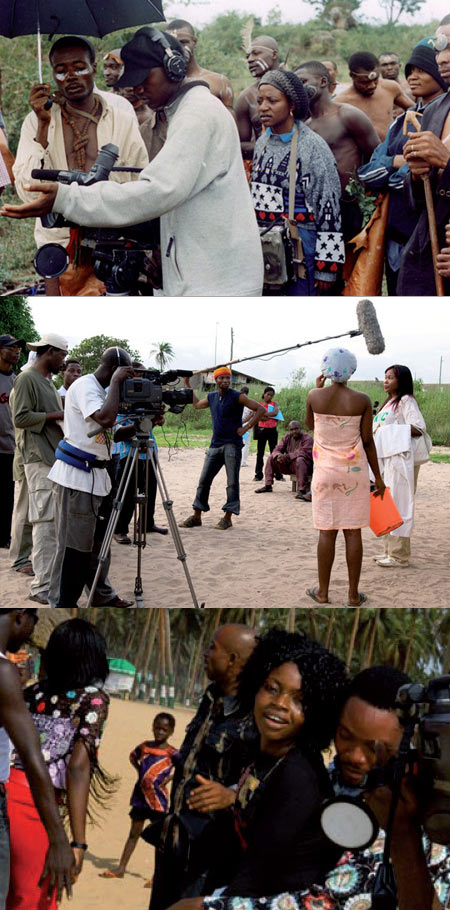nollywood odlok
A video camera, a small crew of technicians and artists, a threeweek time limit, a miniscule budget... The old spoken tradition hand-in-hand with the latest in technology have nutured the flower that has blossomed into the third most productive sector of cinema. Welcome to Nollywood.
All types of films are made. Plots are generaly copied from foreign films and different aspects of Nigerian reality are then also reflected in these films. In Africa down throughout the centuries, stories have been passed on from generation to generation through the oral tradition. The stream of African stories seems to be inexhaustible. Although these films are made on tiny budgets and with few means, they are packed full of energy and strength. These are films made by Nigerians for Nigerians, made quickly and immediately distributed on dvd format. The inhabitants of one of the most populous nations in Africa can buy any film at any market for two or three dollars. In order to combat pirate copies, the films on offer is updated every week. A figure that could shake the foundations of the Western film-making industry: the 1,200 films made every year in Nigeria reach the total cost of 20 million euro (the budget for one small Hollywood production).
Besides, contrary to what a lot of people might believe, there’s not just the one Nollywood. It’s not a single unified business. The biggest and most well-known production outside of Nigeria is centred around Lagos. English is the spoken language here and it is used to spread the Igbo ethnic group culture and ideology. It’s the second oldest industry there. It started in the 70s and is filmed in Yoruba. The third branch is in the hands of the Hausa ethnic group. It is strongly influenced by Islam and Bollywoodesque songs and choreographies are heavily featured in the films. The fourth is the cinema made in the River Niger delta region. Production is smaller here and is run by the Edo ethnic group.
Hollywood was the first home to the factory of dreams and is now the heart of commercial cinema. The Indian Bollywood is the most productive and baroque cinema in the world.
Nollywood...well, Nollywood is a different world altogether. About fifteen years ago, a bunch of merchants who sold electrical goods and gadgets came up with the idea. The made short films that they would then give away free with the products they sold. The complete process was in their hands. They put the money down, wrote the scripts, looked for the actors, directed the films, did the editing, ran off the copies and finally distributed them in their shops. The whole thing was a great success and viewers of these films soon started asking for more films.
All types of films are made. Plots are generaly copied from foreign films and different aspects of Nigerian reality are then also reflected in these films. In Africa down throughout the centuries, stories have been passed on from generation to generation through the oral tradition. The stream of African stories seems to be inexhaustible. Although these films are made on tiny budgets and with few means, they are packed full of energy and strength. These are films made by Nigerians for Nigerians, made quickly and immediately distributed on dvd format. The inhabitants of one of the most populous nations in Africa can buy any film at any market for two or three dollars. In order to combat pirate copies, the films on offer is updated every week. A figure that could shake the foundations of the Western film-making industry: the 1,200 films made every year in Nigeria reach the total cost of 20 million euro (the budget for one small Hollywood production).
Besides, contrary to what a lot of people might believe, there’s not just the one Nollywood. It’s not a single unified business. The biggest and most well-known production outside of Nigeria is centred around Lagos. English is the spoken language here and it is used to spread the Igbo ethnic group culture and ideology. It’s the second oldest industry there. It started in the 70s and is filmed in Yoruba. The third branch is in the hands of the Hausa ethnic group. It is strongly influenced by Islam and Bollywoodesque songs and choreographies are heavily featured in the films. The fourth is the cinema made in the River Niger delta region. Production is smaller here and is run by the Edo ethnic group.
Hollywood was the first home to the factory of dreams and is now the heart of commercial cinema. The Indian Bollywood is the most productive and baroque cinema in the world.
Nollywood...well, Nollywood is a different world altogether. About fifteen years ago, a bunch of merchants who sold electrical goods and gadgets came up with the idea. The made short films that they would then give away free with the products they sold. The complete process was in their hands. They put the money down, wrote the scripts, looked for the actors, directed the films, did the editing, ran off the copies and finally distributed them in their shops. The whole thing was a great success and viewers of these films soon started asking for more films.



